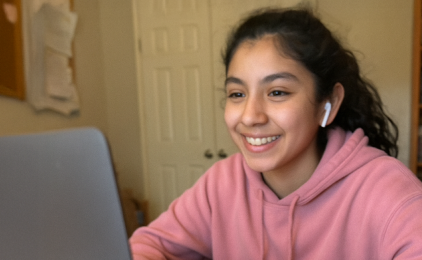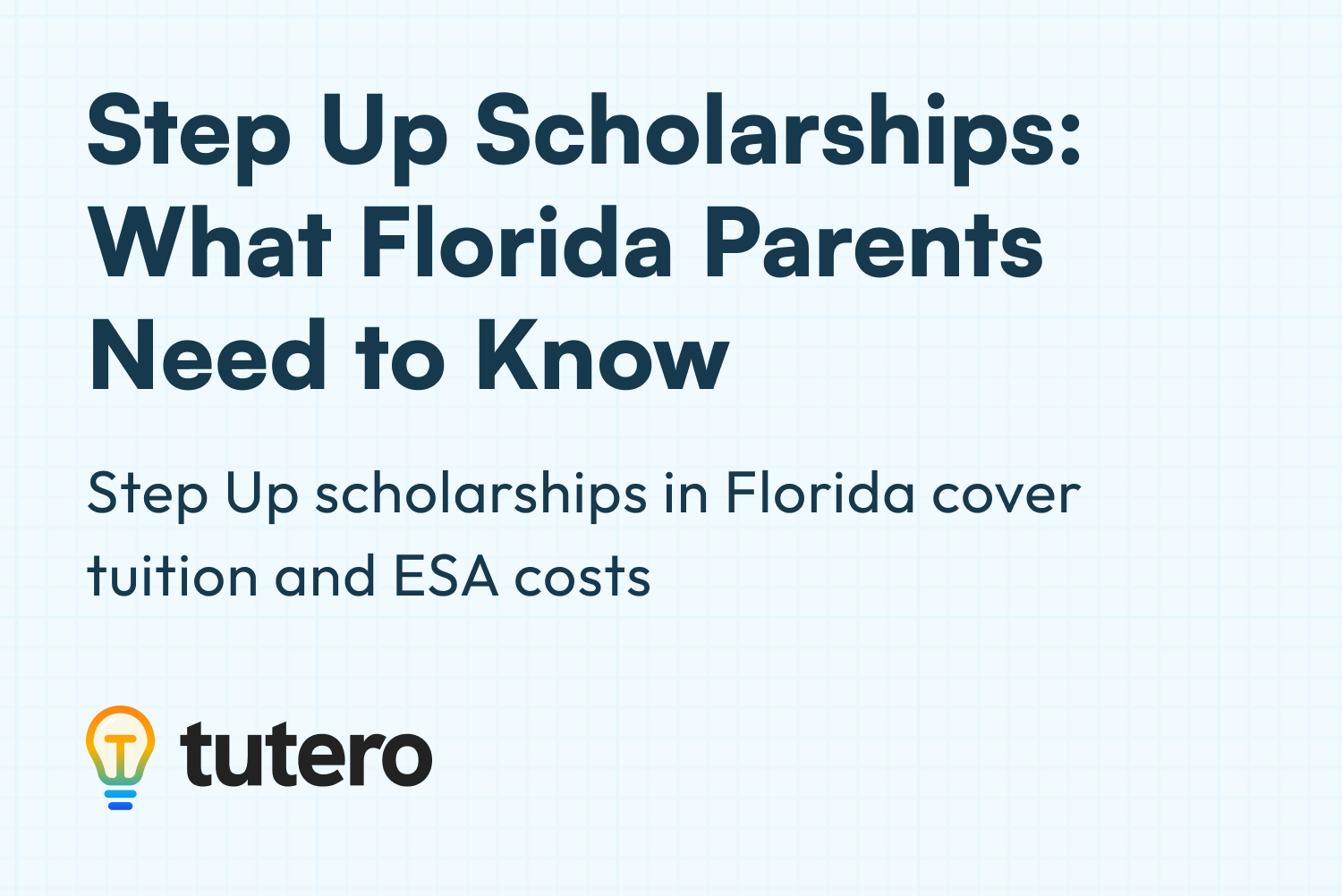The Step Up For Students (SUFS) scholarships open real options for Florida families—but the rules, timelines, and portals can feel like a maze. This guide distils what trips parents up most often, with clear steps to stay ahead. It’s written to be practical and precise, so you can make confident decisions and get the most from your award.

1) Waiting until the last minute to apply or renew
When families try to complete everything in the final days, small snags (a missing document, an unchecked box in EMA) can derail an otherwise eligible application.
Why it matters
- For multiple SUFS programs, renewing households receive priority, and remaining awards are issued on a first-come, first-served basis - leaving late applicants at higher risk if funding caps are reached.
- Certain scholarships publish quarterly funding timelines after enrollment is verified; if you enroll or confirm late, you can miss an early payment window and wait for the next one.
- Incomplete or missing documents - like proof of Florida residency or proof of age - can pause an application until provided.
How to avoid it
- Start early: as soon as applications or renewals open, begin (or log back into) your EMA account and check that every student’s profile is current.
- Pre-gather documents: proof of residency, proof of age, and any program-specific items listed on SUFS renewal checklists, so you’re not hunting at the deadline.
- Build a simple date plan: add three reminders - Apply/Renew window, School/Provider enrollment verification, and the quarterly funding dates that apply to your program—so you’re tracking both application status and when funds typically flow.
- Remember priority and capacity: renewals are prioritised; any remaining awards move first-come, first-served. Acting early preserves options.

2) Misunderstanding What You Can (and Can’t) Buy
Even long-time SUFS families can get caught out by the fine print. Just because something feels educational doesn’t mean it’s eligible.
Why it matters
- Each scholarship—Florida Tax Credit (FTC), Family Empowerment-Educational Options (FES-EO), Family Empowerment-Unique Abilities (FES-UA), and Personalized Education Program (PEP) - has its own approved-spending list in the handbook.
- Reimbursement requests are only paid for authorized uses. Submitting receipts for unapproved or out-of-state purchases can lead to denials and, in repeated cases, suspension from the program.
- Some parents unknowingly pay for items such as out-of-state online schools or generic “learning subscriptions” that don’t meet Florida standards.
How to avoid it
Start every purchase decision with your Parent Handbook. Each program’s guide details what counts as an educational expense. In most cases:
- Allowed: Florida-based tuition, curriculum, tutoring, approved therapies, educational technology, uniforms, and testing fees.
- Not allowed: Travel, food, or out-of-state programs not recognised under Florida statute.
- The safest path is to order through MyScholarShop, SUFS’s built-in marketplace where products are pre-approved. If you need something unique, email the support team for written clarification before buying. One quick check can save weeks of reimbursement delays.
3) Assuming “Awarded” Means “Done”
Many parents breathe a sigh of relief once their child’s scholarship shows “Awarded” in the EMA portal—but that’s only halfway there.
Why it matters
- In the SUFS EMA portal, “Awarded” means eligibility approved — not funded yet.
- FTC & FES-EO (Private School Scholarships):
- Funds only release after your school submits and you approve an invoice.
- SUFS pays the school within 7 business days of both approvals.
- FES-UA & PEP (ESA Programs):
- Funds deposit directly to your EMA account each quarter — usually Aug, Nov, Feb, Apr.
- Deposits can take 2–3 weeks after the funding date, as renewal students are funded first.
- If documents or approvals are late, funding moves to the next quarter.
How to avoid it
After you receive the award email:
- Log into EMA and confirm your provider is approved and linked.
- Complete all invoices and approvals before funding deadlines.
- Track quarterly funding dates in your program’s handbook.
- Expect funds up to 3 weeks after funding day.
- If your balance stays $0, contact SUFS support with your student ID and program name.

4) Spending Too Much on One Thing
When scholarship funds arrive, it’s easy to feel a rush of relief - and then spend big on one major expense. Whether it’s a large tuition payment, a new laptop, or a curriculum bundle, overcommitting funds early can cause headaches later.
Why it matters
- SUFS funds are finite and allocated per academic year, meaning once your balance is depleted, you can’t request more.
- Many families use their entire account on one category - often tuition or technology - and then struggle to cover tutoring, assessments, or supplemental materials later in the year.
- Overpaying schools without leaving room for other learning costs can limit your child’s flexibility and growth opportunities.
How to avoid it
Think of your scholarship as a year-long education budget, not a single payment.
- Plan before you spend. List every likely expense—tuition, curriculum, tutoring, assessments, extracurriculars—and estimate costs.
- Prioritise core learning first, then use remaining funds for extras.
- Leave a small buffer for unexpected needs or late-year activities.
- If you’re unsure how to divide funds, your child’s provider or tutor can help you map out a realistic spending plan that maximises value.
Balanced spending keeps options open and ensures your child benefits from the scholarship throughout the year—not just in the first month.
5) Underestimating the Power of Tutoring and Personal Support
One of the biggest missed opportunities with SUFS is the oversight of tutoring. Parents often spend on materials and technology but forget that personalised teaching is what turns resources into results.
Why it matters
- SUFS explicitly allows tutoring from approved providers, including one-on-one or small-group sessions that align with Florida curriculum or recognised homeschooling standards.
- Tutoring addresses the learning gaps that textbooks and online programs can’t. It helps children stay motivated, build confidence, and maintain steady progress.
- Many Florida families use tutoring to meet Individualized Education Program (IEP) goals under the PEP scholarship, or to reinforce skills tied to their child’s IEP/learning needs under FES-UA.
How to avoid it
Set aside part of your budget for tutoring early.
- Choose qualified providers who are registered with SUFS or who can invoice through the EMA system.
- Be consistent: even one hour per week makes a measurable difference.
- Track outcomes: communicate regularly with your tutor about goals and progress.
A great tutor isn’t an expense—it’s the most effective way to turn your scholarship funds into lasting educational growth.

Final Thoughts
The Step Up For Students scholarship gives families more control than ever over their child’s education, but with that freedom comes responsibility.
By applying early, understanding approved spending, staying proactive after your award, balancing your budget, and investing in tutoring, you’ll avoid the pitfalls that catch so many families off guard.
Used wisely, SUFS can be a powerful, flexible tool—one that not only funds education but truly transforms it.
Stay organised, stay informed, and treat your scholarship like the opportunity it is. Every smart choice you make helps your child learn, grow, and thrive with confidence.
The Step Up For Students (SUFS) scholarships open real options for Florida families—but the rules, timelines, and portals can feel like a maze. This guide distils what trips parents up most often, with clear steps to stay ahead. It’s written to be practical and precise, so you can make confident decisions and get the most from your award.

1) Waiting until the last minute to apply or renew
When families try to complete everything in the final days, small snags (a missing document, an unchecked box in EMA) can derail an otherwise eligible application.
Why it matters
- For multiple SUFS programs, renewing households receive priority, and remaining awards are issued on a first-come, first-served basis - leaving late applicants at higher risk if funding caps are reached.
- Certain scholarships publish quarterly funding timelines after enrollment is verified; if you enroll or confirm late, you can miss an early payment window and wait for the next one.
- Incomplete or missing documents - like proof of Florida residency or proof of age - can pause an application until provided.
How to avoid it
- Start early: as soon as applications or renewals open, begin (or log back into) your EMA account and check that every student’s profile is current.
- Pre-gather documents: proof of residency, proof of age, and any program-specific items listed on SUFS renewal checklists, so you’re not hunting at the deadline.
- Build a simple date plan: add three reminders - Apply/Renew window, School/Provider enrollment verification, and the quarterly funding dates that apply to your program—so you’re tracking both application status and when funds typically flow.
- Remember priority and capacity: renewals are prioritised; any remaining awards move first-come, first-served. Acting early preserves options.

2) Misunderstanding What You Can (and Can’t) Buy
Even long-time SUFS families can get caught out by the fine print. Just because something feels educational doesn’t mean it’s eligible.
Why it matters
- Each scholarship—Florida Tax Credit (FTC), Family Empowerment-Educational Options (FES-EO), Family Empowerment-Unique Abilities (FES-UA), and Personalized Education Program (PEP) - has its own approved-spending list in the handbook.
- Reimbursement requests are only paid for authorized uses. Submitting receipts for unapproved or out-of-state purchases can lead to denials and, in repeated cases, suspension from the program.
- Some parents unknowingly pay for items such as out-of-state online schools or generic “learning subscriptions” that don’t meet Florida standards.
How to avoid it
Start every purchase decision with your Parent Handbook. Each program’s guide details what counts as an educational expense. In most cases:
- Allowed: Florida-based tuition, curriculum, tutoring, approved therapies, educational technology, uniforms, and testing fees.
- Not allowed: Travel, food, or out-of-state programs not recognised under Florida statute.
- The safest path is to order through MyScholarShop, SUFS’s built-in marketplace where products are pre-approved. If you need something unique, email the support team for written clarification before buying. One quick check can save weeks of reimbursement delays.
3) Assuming “Awarded” Means “Done”
Many parents breathe a sigh of relief once their child’s scholarship shows “Awarded” in the EMA portal—but that’s only halfway there.
Why it matters
- In the SUFS EMA portal, “Awarded” means eligibility approved — not funded yet.
- FTC & FES-EO (Private School Scholarships):
- Funds only release after your school submits and you approve an invoice.
- SUFS pays the school within 7 business days of both approvals.
- FES-UA & PEP (ESA Programs):
- Funds deposit directly to your EMA account each quarter — usually Aug, Nov, Feb, Apr.
- Deposits can take 2–3 weeks after the funding date, as renewal students are funded first.
- If documents or approvals are late, funding moves to the next quarter.
How to avoid it
After you receive the award email:
- Log into EMA and confirm your provider is approved and linked.
- Complete all invoices and approvals before funding deadlines.
- Track quarterly funding dates in your program’s handbook.
- Expect funds up to 3 weeks after funding day.
- If your balance stays $0, contact SUFS support with your student ID and program name.

4) Spending Too Much on One Thing
When scholarship funds arrive, it’s easy to feel a rush of relief - and then spend big on one major expense. Whether it’s a large tuition payment, a new laptop, or a curriculum bundle, overcommitting funds early can cause headaches later.
Why it matters
- SUFS funds are finite and allocated per academic year, meaning once your balance is depleted, you can’t request more.
- Many families use their entire account on one category - often tuition or technology - and then struggle to cover tutoring, assessments, or supplemental materials later in the year.
- Overpaying schools without leaving room for other learning costs can limit your child’s flexibility and growth opportunities.
How to avoid it
Think of your scholarship as a year-long education budget, not a single payment.
- Plan before you spend. List every likely expense—tuition, curriculum, tutoring, assessments, extracurriculars—and estimate costs.
- Prioritise core learning first, then use remaining funds for extras.
- Leave a small buffer for unexpected needs or late-year activities.
- If you’re unsure how to divide funds, your child’s provider or tutor can help you map out a realistic spending plan that maximises value.
Balanced spending keeps options open and ensures your child benefits from the scholarship throughout the year—not just in the first month.
5) Underestimating the Power of Tutoring and Personal Support
One of the biggest missed opportunities with SUFS is the oversight of tutoring. Parents often spend on materials and technology but forget that personalised teaching is what turns resources into results.
Why it matters
- SUFS explicitly allows tutoring from approved providers, including one-on-one or small-group sessions that align with Florida curriculum or recognised homeschooling standards.
- Tutoring addresses the learning gaps that textbooks and online programs can’t. It helps children stay motivated, build confidence, and maintain steady progress.
- Many Florida families use tutoring to meet Individualized Education Program (IEP) goals under the PEP scholarship, or to reinforce skills tied to their child’s IEP/learning needs under FES-UA.
How to avoid it
Set aside part of your budget for tutoring early.
- Choose qualified providers who are registered with SUFS or who can invoice through the EMA system.
- Be consistent: even one hour per week makes a measurable difference.
- Track outcomes: communicate regularly with your tutor about goals and progress.
A great tutor isn’t an expense—it’s the most effective way to turn your scholarship funds into lasting educational growth.

Final Thoughts
The Step Up For Students scholarship gives families more control than ever over their child’s education, but with that freedom comes responsibility.
By applying early, understanding approved spending, staying proactive after your award, balancing your budget, and investing in tutoring, you’ll avoid the pitfalls that catch so many families off guard.
Used wisely, SUFS can be a powerful, flexible tool—one that not only funds education but truly transforms it.
Stay organised, stay informed, and treat your scholarship like the opportunity it is. Every smart choice you make helps your child learn, grow, and thrive with confidence.
FAQ
.svg)
.svg)
Online maths tutoring at Tutero is catering to students of all year levels. We offer programs tailored to the unique learning curves of each age group.
.svg)
.svg)
We also have expert NAPLAN and ATAR subject tutors, ensuring students are well-equipped for these pivotal assessments.
.svg)
.svg)
We recommend at least two to three session per week for consistent progress. However, this can vary based on your child's needs and goals.
.svg)
.svg)
Our platform uses advanced security protocols to ensure the safety and privacy of all our online sessions.
.svg)
.svg)
Parents are welcome to observe sessions. We believe in a collaborative approach to education.
.svg)
.svg)
We provide regular progress reports and assessments to track your child’s academic development.
.svg)
.svg)
Yes, we prioritise the student-tutor relationship and can arrange a change if the need arises.
.svg)
.svg)
Yes, we offer a range of resources and materials, including interactive exercises and practice worksheets.
The Step Up For Students (SUFS) scholarships open real options for Florida families—but the rules, timelines, and portals can feel like a maze. This guide distils what trips parents up most often, with clear steps to stay ahead. It’s written to be practical and precise, so you can make confident decisions and get the most from your award.

1) Waiting until the last minute to apply or renew
When families try to complete everything in the final days, small snags (a missing document, an unchecked box in EMA) can derail an otherwise eligible application.
Why it matters
- For multiple SUFS programs, renewing households receive priority, and remaining awards are issued on a first-come, first-served basis - leaving late applicants at higher risk if funding caps are reached.
- Certain scholarships publish quarterly funding timelines after enrollment is verified; if you enroll or confirm late, you can miss an early payment window and wait for the next one.
- Incomplete or missing documents - like proof of Florida residency or proof of age - can pause an application until provided.
How to avoid it
- Start early: as soon as applications or renewals open, begin (or log back into) your EMA account and check that every student’s profile is current.
- Pre-gather documents: proof of residency, proof of age, and any program-specific items listed on SUFS renewal checklists, so you’re not hunting at the deadline.
- Build a simple date plan: add three reminders - Apply/Renew window, School/Provider enrollment verification, and the quarterly funding dates that apply to your program—so you’re tracking both application status and when funds typically flow.
- Remember priority and capacity: renewals are prioritised; any remaining awards move first-come, first-served. Acting early preserves options.

2) Misunderstanding What You Can (and Can’t) Buy
Even long-time SUFS families can get caught out by the fine print. Just because something feels educational doesn’t mean it’s eligible.
Why it matters
- Each scholarship—Florida Tax Credit (FTC), Family Empowerment-Educational Options (FES-EO), Family Empowerment-Unique Abilities (FES-UA), and Personalized Education Program (PEP) - has its own approved-spending list in the handbook.
- Reimbursement requests are only paid for authorized uses. Submitting receipts for unapproved or out-of-state purchases can lead to denials and, in repeated cases, suspension from the program.
- Some parents unknowingly pay for items such as out-of-state online schools or generic “learning subscriptions” that don’t meet Florida standards.
How to avoid it
Start every purchase decision with your Parent Handbook. Each program’s guide details what counts as an educational expense. In most cases:
- Allowed: Florida-based tuition, curriculum, tutoring, approved therapies, educational technology, uniforms, and testing fees.
- Not allowed: Travel, food, or out-of-state programs not recognised under Florida statute.
- The safest path is to order through MyScholarShop, SUFS’s built-in marketplace where products are pre-approved. If you need something unique, email the support team for written clarification before buying. One quick check can save weeks of reimbursement delays.
3) Assuming “Awarded” Means “Done”
Many parents breathe a sigh of relief once their child’s scholarship shows “Awarded” in the EMA portal—but that’s only halfway there.
Why it matters
- In the SUFS EMA portal, “Awarded” means eligibility approved — not funded yet.
- FTC & FES-EO (Private School Scholarships):
- Funds only release after your school submits and you approve an invoice.
- SUFS pays the school within 7 business days of both approvals.
- FES-UA & PEP (ESA Programs):
- Funds deposit directly to your EMA account each quarter — usually Aug, Nov, Feb, Apr.
- Deposits can take 2–3 weeks after the funding date, as renewal students are funded first.
- If documents or approvals are late, funding moves to the next quarter.
How to avoid it
After you receive the award email:
- Log into EMA and confirm your provider is approved and linked.
- Complete all invoices and approvals before funding deadlines.
- Track quarterly funding dates in your program’s handbook.
- Expect funds up to 3 weeks after funding day.
- If your balance stays $0, contact SUFS support with your student ID and program name.

4) Spending Too Much on One Thing
When scholarship funds arrive, it’s easy to feel a rush of relief - and then spend big on one major expense. Whether it’s a large tuition payment, a new laptop, or a curriculum bundle, overcommitting funds early can cause headaches later.
Why it matters
- SUFS funds are finite and allocated per academic year, meaning once your balance is depleted, you can’t request more.
- Many families use their entire account on one category - often tuition or technology - and then struggle to cover tutoring, assessments, or supplemental materials later in the year.
- Overpaying schools without leaving room for other learning costs can limit your child’s flexibility and growth opportunities.
How to avoid it
Think of your scholarship as a year-long education budget, not a single payment.
- Plan before you spend. List every likely expense—tuition, curriculum, tutoring, assessments, extracurriculars—and estimate costs.
- Prioritise core learning first, then use remaining funds for extras.
- Leave a small buffer for unexpected needs or late-year activities.
- If you’re unsure how to divide funds, your child’s provider or tutor can help you map out a realistic spending plan that maximises value.
Balanced spending keeps options open and ensures your child benefits from the scholarship throughout the year—not just in the first month.
5) Underestimating the Power of Tutoring and Personal Support
One of the biggest missed opportunities with SUFS is the oversight of tutoring. Parents often spend on materials and technology but forget that personalised teaching is what turns resources into results.
Why it matters
- SUFS explicitly allows tutoring from approved providers, including one-on-one or small-group sessions that align with Florida curriculum or recognised homeschooling standards.
- Tutoring addresses the learning gaps that textbooks and online programs can’t. It helps children stay motivated, build confidence, and maintain steady progress.
- Many Florida families use tutoring to meet Individualized Education Program (IEP) goals under the PEP scholarship, or to reinforce skills tied to their child’s IEP/learning needs under FES-UA.
How to avoid it
Set aside part of your budget for tutoring early.
- Choose qualified providers who are registered with SUFS or who can invoice through the EMA system.
- Be consistent: even one hour per week makes a measurable difference.
- Track outcomes: communicate regularly with your tutor about goals and progress.
A great tutor isn’t an expense—it’s the most effective way to turn your scholarship funds into lasting educational growth.

Final Thoughts
The Step Up For Students scholarship gives families more control than ever over their child’s education, but with that freedom comes responsibility.
By applying early, understanding approved spending, staying proactive after your award, balancing your budget, and investing in tutoring, you’ll avoid the pitfalls that catch so many families off guard.
Used wisely, SUFS can be a powerful, flexible tool—one that not only funds education but truly transforms it.
Stay organised, stay informed, and treat your scholarship like the opportunity it is. Every smart choice you make helps your child learn, grow, and thrive with confidence.
Lorem ipsum dolor sit amet, consectetur adipiscing elit. Suspendisse varius enim in eros elementum tristique. Duis cursus, mi quis viverra ornare, eros dolor interdum nulla, ut commodo diam libero vitae erat. Aenean faucibus nibh et justo cursus id rutrum lorem imperdiet. Nunc ut sem vitae risus tristique posuere.
Lorem ipsum dolor sit amet, consectetur adipiscing elit. Suspendisse varius enim in eros elementum tristique. Duis cursus, mi quis viverra ornare, eros dolor interdum nulla, ut commodo diam libero vitae erat. Aenean faucibus nibh et justo cursus id rutrum lorem imperdiet. Nunc ut sem vitae risus tristique posuere.


The Step Up For Students (SUFS) scholarships open real options for Florida families—but the rules, timelines, and portals can feel like a maze. This guide distils what trips parents up most often, with clear steps to stay ahead. It’s written to be practical and precise, so you can make confident decisions and get the most from your award.

1) Waiting until the last minute to apply or renew
When families try to complete everything in the final days, small snags (a missing document, an unchecked box in EMA) can derail an otherwise eligible application.
Why it matters
- For multiple SUFS programs, renewing households receive priority, and remaining awards are issued on a first-come, first-served basis - leaving late applicants at higher risk if funding caps are reached.
- Certain scholarships publish quarterly funding timelines after enrollment is verified; if you enroll or confirm late, you can miss an early payment window and wait for the next one.
- Incomplete or missing documents - like proof of Florida residency or proof of age - can pause an application until provided.
How to avoid it
- Start early: as soon as applications or renewals open, begin (or log back into) your EMA account and check that every student’s profile is current.
- Pre-gather documents: proof of residency, proof of age, and any program-specific items listed on SUFS renewal checklists, so you’re not hunting at the deadline.
- Build a simple date plan: add three reminders - Apply/Renew window, School/Provider enrollment verification, and the quarterly funding dates that apply to your program—so you’re tracking both application status and when funds typically flow.
- Remember priority and capacity: renewals are prioritised; any remaining awards move first-come, first-served. Acting early preserves options.

2) Misunderstanding What You Can (and Can’t) Buy
Even long-time SUFS families can get caught out by the fine print. Just because something feels educational doesn’t mean it’s eligible.
Why it matters
- Each scholarship—Florida Tax Credit (FTC), Family Empowerment-Educational Options (FES-EO), Family Empowerment-Unique Abilities (FES-UA), and Personalized Education Program (PEP) - has its own approved-spending list in the handbook.
- Reimbursement requests are only paid for authorized uses. Submitting receipts for unapproved or out-of-state purchases can lead to denials and, in repeated cases, suspension from the program.
- Some parents unknowingly pay for items such as out-of-state online schools or generic “learning subscriptions” that don’t meet Florida standards.
How to avoid it
Start every purchase decision with your Parent Handbook. Each program’s guide details what counts as an educational expense. In most cases:
- Allowed: Florida-based tuition, curriculum, tutoring, approved therapies, educational technology, uniforms, and testing fees.
- Not allowed: Travel, food, or out-of-state programs not recognised under Florida statute.
- The safest path is to order through MyScholarShop, SUFS’s built-in marketplace where products are pre-approved. If you need something unique, email the support team for written clarification before buying. One quick check can save weeks of reimbursement delays.
3) Assuming “Awarded” Means “Done”
Many parents breathe a sigh of relief once their child’s scholarship shows “Awarded” in the EMA portal—but that’s only halfway there.
Why it matters
- In the SUFS EMA portal, “Awarded” means eligibility approved — not funded yet.
- FTC & FES-EO (Private School Scholarships):
- Funds only release after your school submits and you approve an invoice.
- SUFS pays the school within 7 business days of both approvals.
- FES-UA & PEP (ESA Programs):
- Funds deposit directly to your EMA account each quarter — usually Aug, Nov, Feb, Apr.
- Deposits can take 2–3 weeks after the funding date, as renewal students are funded first.
- If documents or approvals are late, funding moves to the next quarter.
How to avoid it
After you receive the award email:
- Log into EMA and confirm your provider is approved and linked.
- Complete all invoices and approvals before funding deadlines.
- Track quarterly funding dates in your program’s handbook.
- Expect funds up to 3 weeks after funding day.
- If your balance stays $0, contact SUFS support with your student ID and program name.

4) Spending Too Much on One Thing
When scholarship funds arrive, it’s easy to feel a rush of relief - and then spend big on one major expense. Whether it’s a large tuition payment, a new laptop, or a curriculum bundle, overcommitting funds early can cause headaches later.
Why it matters
- SUFS funds are finite and allocated per academic year, meaning once your balance is depleted, you can’t request more.
- Many families use their entire account on one category - often tuition or technology - and then struggle to cover tutoring, assessments, or supplemental materials later in the year.
- Overpaying schools without leaving room for other learning costs can limit your child’s flexibility and growth opportunities.
How to avoid it
Think of your scholarship as a year-long education budget, not a single payment.
- Plan before you spend. List every likely expense—tuition, curriculum, tutoring, assessments, extracurriculars—and estimate costs.
- Prioritise core learning first, then use remaining funds for extras.
- Leave a small buffer for unexpected needs or late-year activities.
- If you’re unsure how to divide funds, your child’s provider or tutor can help you map out a realistic spending plan that maximises value.
Balanced spending keeps options open and ensures your child benefits from the scholarship throughout the year—not just in the first month.
5) Underestimating the Power of Tutoring and Personal Support
One of the biggest missed opportunities with SUFS is the oversight of tutoring. Parents often spend on materials and technology but forget that personalised teaching is what turns resources into results.
Why it matters
- SUFS explicitly allows tutoring from approved providers, including one-on-one or small-group sessions that align with Florida curriculum or recognised homeschooling standards.
- Tutoring addresses the learning gaps that textbooks and online programs can’t. It helps children stay motivated, build confidence, and maintain steady progress.
- Many Florida families use tutoring to meet Individualized Education Program (IEP) goals under the PEP scholarship, or to reinforce skills tied to their child’s IEP/learning needs under FES-UA.
How to avoid it
Set aside part of your budget for tutoring early.
- Choose qualified providers who are registered with SUFS or who can invoice through the EMA system.
- Be consistent: even one hour per week makes a measurable difference.
- Track outcomes: communicate regularly with your tutor about goals and progress.
A great tutor isn’t an expense—it’s the most effective way to turn your scholarship funds into lasting educational growth.

Final Thoughts
The Step Up For Students scholarship gives families more control than ever over their child’s education, but with that freedom comes responsibility.
By applying early, understanding approved spending, staying proactive after your award, balancing your budget, and investing in tutoring, you’ll avoid the pitfalls that catch so many families off guard.
Used wisely, SUFS can be a powerful, flexible tool—one that not only funds education but truly transforms it.
Stay organised, stay informed, and treat your scholarship like the opportunity it is. Every smart choice you make helps your child learn, grow, and thrive with confidence.
Lorem ipsum dolor sit amet, consectetur adipiscing elit. Suspendisse varius enim in eros elementum tristique. Duis cursus, mi quis viverra ornare, eros dolor interdum nulla, ut commodo diam libero vitae erat. Aenean faucibus nibh et justo cursus id rutrum lorem imperdiet. Nunc ut sem vitae risus tristique posuere.
Lorem ipsum dolor sit amet, consectetur adipiscing elit. Suspendisse varius enim in eros elementum tristique. Duis cursus, mi quis viverra ornare, eros dolor interdum nulla, ut commodo diam libero vitae erat. Aenean faucibus nibh et justo cursus id rutrum lorem imperdiet. Nunc ut sem vitae risus tristique posuere.


Hoping to improve confidence & grades?

Want to save hours each week on planning?
.png)
.svg)

.avif)






.svg)


.png)
.svg)






.svg)


.svg)



